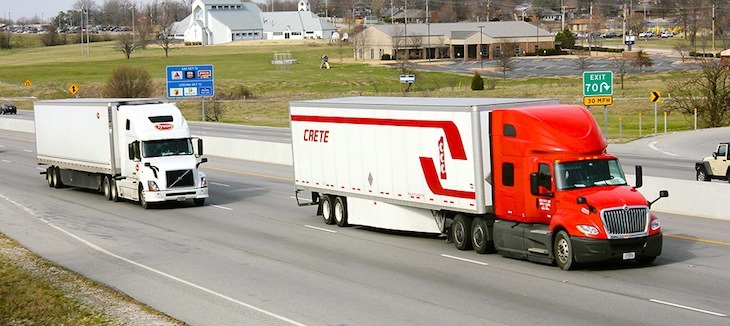Truck orders to remain low in 2020, tonnage up slightly in January
by February 18, 2020 3:20 pm 1,803 views

Heavy-duty truck manufacturers expect production to decline by about 30% in 2020, from 2019, as truck orders fall to below levels needed to replace existing fleets, a market expert said. Meanwhile, truck tonnage rose narrowly in January.
In a recent webinar, Michael Baudendistel, market expert with FreightWaves, said orders of class 8 trucks, the largest truck class, are expected to be about 18,000 to 19,000 per month in 2020. While this is lower than replacement demand, Baudendistel said some of the demand was pulled forward. In 2019, the backlog of class 8 orders fell to 123,000, from 297,000.
Baudendistel said the value of a five-year-old class 8 truck fell about $10,000 to nearly $34,000 in 2019, from 2018. New trucks are often first traded in after about five years, and he expected lower used truck prices to continue as a result of increased supply.
Class 8 production was strong in four of the past six years, but orders for 2019 were the worst of any year in the past decade, he said. So far this year, spot rates have not been high enough to encourage a greater amount of new orders. Dry-van spot rates fell 4.4% in January, from the same month in 2019, according to DAT Solutions.
American Trucking Associations’ advanced seasonally adjusted For-Hire Truck Tonnage Index rose 0.1% in January, from December, according to the ATA. The index rose 0.8% in January, from the same month in 2019.
“Over the last two months, the tonnage index has increased 0.6%, which is obviously good news,” said ATA Chief Economist Bob Costello. “However, after our annual revision, it is clear that tonnage peaked in July 2019, and even with the recent gains, is down 1.8% since then. Softness in manufacturing and elevated inventories continue to weigh on the truck freight tonnage.”
In January, class 8 U.S. retail sales fell below 16,000 units for the first time since January 2018, according to WardsAuto.com. Sales declined 22.5% to 15,645 in January, from 20,192 in the same month in 2019.
All truck manufacturers reported sales declines for the month, except for Peterbilt Motors Co., which is a division of Paccar Inc., according to a Transport Topics article. Peterbilt sales rose 8.1% to 2,669, which accounted for a 17.1% market share. Freightliner, which is a division of Daimler Trucks North America, has a 38.7% market share, but sales declined 34.2% to 6,060, the article shows.
North American class 8 net orders fell 12% to 17,700 units in January, from December, according to ACT Research. The orders were up 10% from January 2019.
“Weak freight market and rate conditions, as well as the residual backlog cushion, continue to bedevil new class 8 order activity,” said Kenny Vieth, president and senior analyst for ACT. “Notably, January’s year-over-year result is the first positive class 8 order comparison in 15 months, and while actual orders in January were below the (fourth-quarter) average, they were more closely aligned on a seasonally adjusted basis.”
With regard to North American class 8 natural gas trucks, retail sales increased 20% through the first 11 months in 2019, from the same period in 2018, according to ACT.
“Bucking the declining pattern of the past few years, year-to-date November 2019 sales appear to be gaining ground, with sales of natural-gas-powered vehicles on an overall upward trajectory,” said Ken Vieth, senior partner and general manager at ACT Research. Ken Vieth noted the majority of the sales could be attributed to refuse, transit and school bus operators. The majority of the trucking companies buying natural gas trucks purchased them to replace existing ones or added to their existing fleets.
The number of natural gas stations has declined, while the number of electric charging stations has risen, Ken Vieth said. “Further analysis shows that the number of planned private heavy-duty CNG stations is growing,” he added. “Regarding electric commercial vehicles, right now we’re witnessing a tug-of-war between fuel-cell and battery technology investment in the class 8 over-the-road market, and it’s way too early for us to call a winner.”
In 2017, Tesla CEO Elon Musk said in a tweet the company was going to announce an electric big rig that “will blow your mind clear out of your skull and into an alternate dimension.” Shortly after the announcement, Bentonville-based retailer Walmart Inc. and Lowell-based carrier J.B. Hunt Transport Services Inc. placed reservations on the class 8, battery-electric Tesla Semi. They are among multiple companies that have collectively ordered thousands of the Tesla big rigs, according to a recent FreightWaves article. A limited number of the big rigs are expected to be put into commercial operation in 2020. The trucks are expected to cost about $150,000 for the one with a 300-mile range and $180,000 for the one with a 600-mile range, the article shows.
J.B. Hunt plans to purchase 40 of the Tesla Semi trucks. Walmart previously planned to buy 45. The first all-electric trucks J.B. Hunt added to its fleet were the five Mitsubishi Fuso eCanter trucks the carrier revealed in a media event Dec. 5, 2018.
